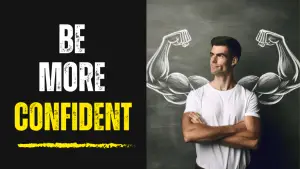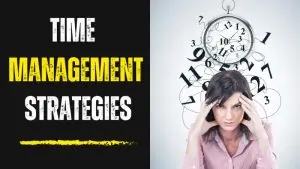Learning How to Be More Confident
Wanting to feel good about ourselves is natural, and self-confidence plays a big role in that.
That’s why learning how to be more confident is such a valuable goal.
But, it’s not just about feeling great.
Self-confidence actually makes us more motivated to do things.
It’s like a secret ingredient that makes success more likely whenever we try something new.
This is because if we start off thinking we’re going to fail, we probably will (Bénabou & Tirole, 2002).
So, it’s clear why boosting our self-confidence is something many of us aim for.
Ok, let’s dive into some straightforward tips to help increase that confidence:
Discovering Your Value
Understanding your own value is the cornerstone of learning how to be more confident.
It’s crucial to recognize that we all have worth.
Yet, for many of us, there’s this nagging feeling of being insignificant, unlovable, or just not measuring up, this couldn’t be further from the truth.
If you often find yourself battling these thoughts, it’s possible that these beliefs were planted in you by others.
Maybe it was a result of overly critical parents, mean-spirited peers at school, or societal messages that judged you based on your gender, race, or other characteristics.
The beliefs we form about our worth in these early days stick with us, shaping how we see ourselves.
The longer we’ve lived with these negative views, the tougher they are to shake off.
Changing these deep-seated beliefs might take a lot of effort and time, but it’s definitely possible.
You might need to consistently tell yourself, “I am valuable” or “I am just as worthy as anyone else,” instead of “I’m not worth it.”
Positive affirmations like these are powerful tools for teaching your mind to see your true worth (Owens, 1993).
Embracing your inherent worth is vital for your boosting self-confidence.
When we understand the negative views we have about ourselves are usually rooted in false and imposed beliefs, we can then start working on breaking free from them.
By affirming your value repeatedly, you can start to shift your mindset and truly believe in your own worth.
This shift is a fundamental step in the journey towards becoming more confident.
Embrace Your Qualities
A key part of learning how to be more confident is recognizing and appreciating your own positive qualities.
It’s not just about knowing your worth, it’s about seeing the good in yourself, acknowledging that you have traits and skills that are valuable and may even be exceptional.
We’ve all got strengths.
However, it’s easy to get caught up focusing on what we think we’re missing, leaving us little room to appreciate the good traits we do possess.
If you find yourself stuck in this cycle, creating a list of your positive attributes can be incredibly helpful.
Consider things like your sense of humour, your perseverance, your creativity, and any other qualities that you admire about yourself.
The challenge then becomes to shift your focus towards these positives, consciously choosing to give them the attention they deserve.
Acknowledging that you possess admirable qualities is crucial for self-confidence.
This step goes beyond merely understanding your inherent worth; it’s about recognizing the specific aspects of yourself that are commendable and perhaps even outstanding.
Like I mentioned everyone has strengths, but focusing too much on what we lack can overshadow our ability to see our positive attributes.
So if you’re struggling with this, consider making that list of your positive traits.
The goal is to then adjust your mindset to prioritize these strengths in your self-perception.
Recognize Your Strengths
In the journey of figuring out how to be more confident, it’s not just about acknowledging your good qualities but also understanding your strengths.
According to Owens (1993), identifying what you excel in allows you to seek out environments where you can shine.
Engaging in activities that play to your strengths often leads to a boost in self-confidence because it results in consistent successes.
These successes serve as reminders of your abilities, reinforcing the belief in your own competence.
The process involves making a detailed list of your strengths.
Consider areas where you’ve consistently performed well or received positive feedback.
Then, actively look for opportunities to apply these strengths more frequently in your daily life.
By doing so, you’ll not only affirm your skills but also build a robust foundation for lasting confidence.
Be Kind to Yourself
One significant step in learning how to be more confident involves changing how we treat ourselves mentally.
Owens (1993) points out the importance of cultivating a positive self-attitude.
It’s not uncommon to have a harsh inner voice that criticizes every small mistake or moments when we’re less than perfect.
If you find yourself frequently battling this inner critic, it’s time to start defending yourself.
For instance, when your inner critic attacks with, “You should have done better,” it’s crucial to counteract these thoughts.
Challenge these negative self-judgments by affirming, “I did the best I could, and I’m proud of the effort I made.”
Engaging in such positive self-talk is essential for rewriting the negative narratives in our minds, paving the way towards a more confident self.
Just Do Your Best
Putting in your best effort is a powerful way to silence that nagging inner critic.
Whenever you catch yourself being overly critical, simply remind yourself, “I did my best.” That’s all anyone can ask for.
By focusing on doing your best, without the unrealistic expectation of perfection or the belief that you should always do more, you open the door to being kinder and more accepting of yourself.
This approach not only helps in dealing with self-doubt but also plays a crucial role in learning how to be more confident.
Wrapping It Up
Boosting self-confidence might seem challenging, but by honing in on these essential practices, you’re setting the stage for improvement.
These strategies are designed to guide you toward enhancing your self-confidence, hopefully making the journey a bit easier and more straightforward.
References
● Bénabou, R., & Tirole, J. (2002). Self-confidence and personal motivation. The quarterly journal of economics, 117(3), 871-915.
● Owens, T. J. (1993). Accentuate the positive-and the negative: Rethinking the use of self-esteem, self-deprecation, and self-confidence. Social Psychology Quarterly, 288-299.






